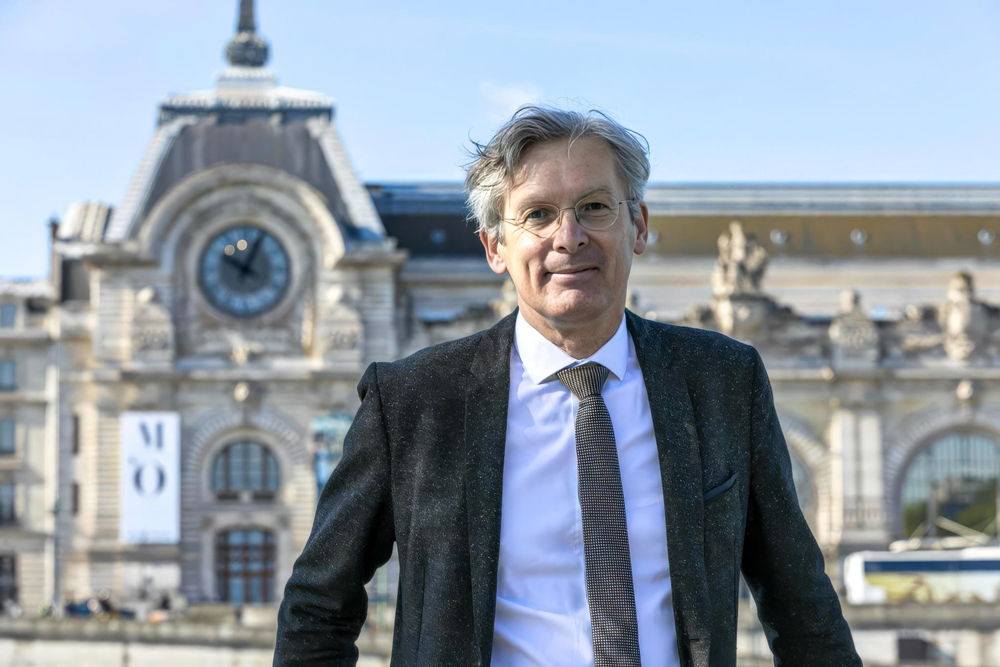Sylvain Amic, the president of the Musée d’Orsay and the Musée de l’Orangerie in Paris, has died at the age of 58. His death by heart failure was announced on X by the French culture minister Rachida Dati. Born in Dakar, Amic worked as a teacher before joining the Musée Fabre in Montpellier, where he oversaw its collections of 19th- and 20th-century art. As well as curating exhibitions at the Grand Palais in 2008 and 2012, Amic directed a group of 11 museums in Rouen from 2011 onwards. In 2022, he began working as an arts advisor to then culture minister Rima Abdul Malak. Amic was appointed director of Musée d’Orsay in April 2024 by President Emmanuel Macron. Macron has publicly commended Amic’s work to ‘ensure that everyone could access the wonders of art, from Soulages to Manet’, while Adbul Malak has told the New York Times that Amic had ‘[fulfilled] his lifelong dream of becoming the head of Orsay, even if it was a dream that ended much too soon’.
Kim Sajet, the former director of the Smithsonian’s National Portrait Gallery who resigned in June following Trump’s declaration that he had fired her, will be the next director of the Milwaukee Art Museum, the museum announced on 3 September. Andy Nunemaker, chair of the museum’s board of trustees, told the New York Times that Sajet was ‘everything [the museum] had been looking for in a director’, adding that her ‘championing accessibility is directly in line with what we believe in’. The previous director was Marcelle Polednik, who led the museum since 2016 and stepped down in July. Sajet will take over the role on 22 September.
The Museums Association has published a new draft of its code of ethics, which the organisation is updating for the first time since 2015. The draft is a result of the Association’s two-year review of the code to ‘better reflect changes in the sector and society since the last review’. The new draft includes more explicit guidance around funding from fossil fuel companies, encouraging museums to ‘Transition away from sponsorship from organisations involved with environmental harm (including fossil fuels), human rights abuses, and other sponsorship that does not align with the values of the museum.’ The members of the association, which represents museums and galleries in the UK, will vote on ratifying the changes between 15 September and the Association’s AGM on 7 October.
Amy Sherald has announced that her exhibition ‘American Sublime’ which she recently blocked from travelling to the Smithsonian’s National Portrait Gallery due to censorship concerns – will now move to the Baltimore Museum of Art instead. Asma Naeem, director of the museum, said that the exhibition’s presentation in Baltimore – where the artist has both worked and studied – is a ‘celebration of our creative community and a joyful reunion with those shaped by Amy’s extraordinary power to connect’.
Argentine authorities have recovered a painting by the baroque portraitist Giuseppe Ghislandi that had been looted by the Nazis and was believed missing for 80 years, reports the BBC. Last month the Dutch newspaper Algemeen Dagblad reported that Ghislandi’s Portrait of a Lady (1710) had appeared in a photo of a property listed for sale on an Argentine estate agent’s website. The property belonged to Patricia Kadgien, daughter of Friedrich Kadgien, an advisor to Hermann Göring. The painting had been in the collection of the Dutch art dealer Jacques Goudstikker, much of which was seized and sold off by the Nazis after he died in 1940 while trying to escape the regime. Kadgien’s lawyer handed over the painting to prosecutors and Kadgien has now appeared in court on charges relating to aggravated concealment of property.
Olivier Meslay will step down next summer as director of the Clark Art Institute in Williamstown, Massachusetts. He will have been in the role for 10 years. Before arriving at the Clark, he was associate director for curatorial affairs at the Dallas Museum of Art. He moved to the United States in 2009, after 16 years at the Louvre, during which time he was chief curator in charge of the Louvre-Lens project. As director of the Clark he oversaw the expansion and renovation of its premises and in 2023 made admission free during winter, which has led to a 60 per cent increase in winter attendance since the initiative began.
In appointments, Bénédicte Gady, who has been interim director of the Musée des Arts Décoratifs since October, took up the position permanently earlier this week. After six years as curator of graphic arts at the museum, she replaced Christine Macel, who stepped down after an external audit into working practices at the museum.
